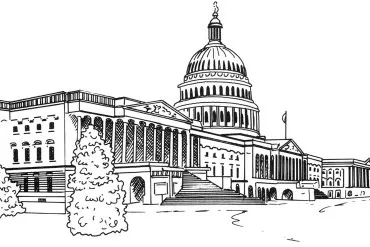A Report on Congress (Part 1 of 4)

The 117th Congress has been the most pro-union in 80 years. With pro-worker Democrats controlling the House of Representatives, Senate, and the White House, we saw critical legislation pass that will improve the quality of life for working families for generations. See how our US Representatives voted in the First Session of the 117th Congress (2021).
HOW OUR REPRESENTATIVES VOTED | FIRST SESSION
| Name | District | Party | Score | Lifetime Score | A | B | C | D | E | F | G | H | I | J | K | L | M | N | O | P | Q | R | S | T | U |
| Marcy Kaptur | 9 | Democrat | 100% | 98% | ✓ | ✓ | ✓ | ✓ | ✓ | ✓ | ✓ | ✓ | ✓ | ✓ | ✓ | ✓ | ✓ | ✓ | ✓ | ✓ | ✓ | ✓ | ✓ | ✓ | ✓ |
| Shontel Brown | 11 | Democrat | 100% | 100% | ✓ | ✓ | |||||||||||||||||||
| Marcia L. Fudge | 11 | Democrat | 100% | 98% | ✓ | ✓ | ✓ | ✓ | ✓ | ✓ | ✓ | ||||||||||||||
| Tim Ryan | 13 | Democrat | 100% | 98% | ✓ | ✓ | ✓ | ✓ | ✓ | ✓ | ✓ | ✓ | ✓ | ✓ | ✓ | ✓ | ✓ | ✓ | ✓ | ✓ | ✓ | ✓ | ✓ | ✓ | ✓ |
| Dave Joyce | 14 | Republican | 23% | 39% | x | ✓ | x | x | x | x | x | x | ✓ | x | x | ✓ | x | x | ✓ | ✓ | x | x | x | x | x |
| Anthony Gonzalez | 16 | Republican | 23% | 31% | x | ✓ | x | x | x | x | x | x | ✓ | x | x | ✓ | x | x | ✓ | x | x | x | x | ✓ | x |
A. Budget Resolution
This bill allowed Congress to pass critical COVID-19 relief with a simple majority vote and avoid a filibuster in the Senate. It helped the nation respond to the public health and economic emergency presented by the COVID-19 pandemic. This bill passed the House on Feb. 3, 2021.
B. Apprenticeship Act
H.R. 447 would modernize the Registered Apprenticeship Program by authorizing significant new funding to expand registered apprenticeships, pre-apprenticeships and youth apprenticeships in the United States.
C. Equality Act
This legislation protects Americans from discrimination on the basis of sex, sexual orientation or gender identity while seeking housing, applying for credit and pursuing an education, and in other key pathways to the American dream. While the Title VII Supreme Court decision barred job discrimination, the Equality Act would codify that ruling. LGBTQ people deserve to be free from discrimination in all forms. This bill passed the House on Feb. 25, 2021.
D. American Rescue Plan
This bill provided $1.9 trillion in emergency assistance to the American people during the unprecedented COVID-19 crisis.
E. For the People Act
For years, some of the rich and powerful have tried to make it harder to register and vote. This legislation gives voters tools to defeat those seeking to gain power through intimidation, coercion and voter suppression.
F. George Floyd Justice in Policing Act
After George Floyd was murdered by a Minneapolis police officer, the labor movement demanded more accountability from law enforcement. Though not perfect, this bill would reform policing by banning chokeholds, expanding use of body cameras, ending racial profiling, demilitarizing our police forces and ending no-knock warrants. This bill passed the House on March 3, 2021.
G. Protecting the Right to Organize (PRO) Act
The Protecting the Right to Organize (PRO) Act is landmark worker empowerment, civil rights and economic stimulus legislation. It would hold employers accountable when they violate workers’ rights and ensure that most workers are protected under the National Labor Relations Act. It would also protect collective action and strengthen employees’ bargaining rights so they can negotiate for higher wages, better benefits, a safer workplace and a more secure retirement.
Finally, the bill would modernize the union election and enforcement process to protect against years of systematic corporate attempts to weaken elections. This bill passed the House on March 9, 2021.
H. Equal Rights Amendment (ERA)
Thirty-eight states have passed an Equal Rights Amendment to the Constitution stating that women have equal rights. This satisfies the requirement that three-fourths of states must vote in favor of the amendment. However, there is an additional congressionally imposed deadline that this bill would remove in order to allow for the amendment’s passage. This bill passed the House on March 17, 2021.
I. Violence Against Women Act
The reauthorization of the 1994-enacted Violence Against Women Act (VAWA) would provide domestic abuse survivors with health care and other social services and improve access to critical resources such as housing. This new version of VAWA would also expand assistance to the LGBTQ community and underserved communities of color. This bill passed the House on March 17, 2021.
J. DREAM Act
This legislation would benefit all workers by providing a well-earned path to citizenship for immigrant workers who have been making positive contributions to society for decades. Recipients of TPS (Temporary Protected Status), DACA (Deferred Action for Childhood Arrivals) and DED (Deferred Enforced Departure) help to build, feed, serve, educate and care for our nation. This bill passed the House on March 18, 2021.
K. Paycheck Fairness Act
The Paycheck Fairness Act would update the Equal Pay Act. Although the 1963 law made it illegal for employers to pay unequal wages to male and female employees for the same work, wage disparities persist in both the private and public sectors, at every educational level, across the country.
L. Workplace Violence in Health Care
Workplace violence is a serious and growing safety and health problem that has reached epidemic levels—it is now the third-leading cause of job deaths and responsible for more than 30,000 serious lost-time injuries each year.
M. NO BAN Act
The National Origin-Based Antidiscrimination for Nonimmigrants (NO BAN) Act would repeal the previous administration’s efforts to ban Muslims, Africans, refugees and asylum seekers, and make necessary reforms to restore checks and balances and prevent future discriminatory bans. This bill passed the House on April 12, 2021.
N. Washington, D.C. Admission Act
This bill would grant statehood to the District of Columbia, making it the 51st state. Although Washington, D.C.’s population is now greater than both Vermont and Wyoming, its residents are without a constitutional right to voting representation in Congress. This bill passed the House on April 22, 2021.
O. Pregnant Workers Fairness Act
This legislation would close gaps in current law, creating a clear nationwide standard for reasonable workplace accommodations for pregnant workers so they are not pushed out of the workforce.
It would promote workplace gender equity, healthy pregnancies and the economic security of pregnant and parenting workers and their families. This bill passed the House on May 14, 2021.
P. Older Workers Discrimination Act
This bill would restore fairness to workers age 40 and older who experience discrimination in the workplace because of their age. It would restore protections that were weakened by the Supreme Court, which raised the burden of proof to show age discrimination. The bill also would provide remedies for workers who are retaliated against when they report age discrimination. This bill passed the House on June 23, 2021.
Q. INVEST in America Act
This bill would make significant investments in American infrastructure through surface transportation, rail and transit systems, electric vehicle charging stations, aviation, energy production and distribution, schools, broadband, drinking water and wastewater infrastructure, and housing. It would help us meet the demands of a 21st-century economy.
R. Labor, Health and Human Services, and Education Appropriations
The fiscal year 2022 appropriations bill combined funding measures for numerous federal agencies, including the departments of Labor, Health and Human Services, and Education. It increased funding for these key domestic agencies by an average of 28% and reversed the long-standing underinvestment in worker protection programs and critical public services. This bill passed the House on July 29, 2021.
S. John R. Lewis Voting Rights Advancement Act of 2021
This bipartisan legislation helps protect our nation’s citizens from discriminatory voting practices and restores the ability to mount effective legal challenges to anti-democratic voting measures. Passage would be an important step toward restoration of the fundamental voter protections undermined by the Supreme Court’s 2013 Shelby County v. Holder decision and its 2021 decision in Brnovich v. Democratic National Committee. This bill passed the House on Aug. 24, 2021.
T. Infrastructure Investment and Jobs Act
After decades of delay and infrastructure decline, the House passed a bipartisan infrastructure bill. Centered around the creation of good union jobs, the bill provides for a $1 trillion investment in roads, bridges, transit, rail, climate change mitigation, electric vehicles, clean drinking water, high-speed internet, resilient transmission lines and more. The bill also includes labor standards guaranteeing that the jobs created have family-supporting wages, as well as “buy America” provisions that will bolster U.S. manufacturing. This bill passed the House on Nov. 5, 2021.
U. Build Back Better Act
The Build Back Better Act (BBB) is a major $1.75 trillion investment to provide child care and elder care for millions of families, universal preschool, clean energy jobs, expanded health care and paid leave, tax fairness and support for worker union organizing. It would also provide meaningful protections for immigrants and includes policies to curb excessive prescription drug costs. This bill passed the House on Nov. 19, 2021.
